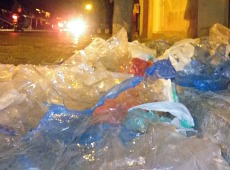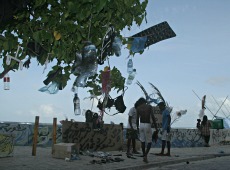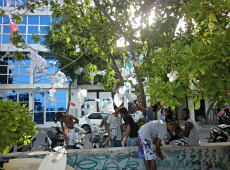As authorities continue efforts to eradicate littering from the capital city Malé, the council has today revealed the scale of the problem.
Statistics released by Malé City Council showed the litter collected on the streets of Malé on a single day amounted to nearly one ton’s worth.
Among the waste collected was 18,499 empty bottles of water, 1,868 bottles of soft drinks, 4,198 juice packets, 8,740 soda cans, and 8,384 empty cigarette packs.
“I would like to call upon those living in Malé to keep the streets clean,” said Director General at the Environmental Protection Agency (EPA) Ahmed Naeem.
“It’s not just your homes you should clean for Ramadan. Malé is a small, congested island with a large number of inhabitants. Every one needs to do their bit to keep the island more habitable.”
Naeem stated that the amount of waste observed on streets has increased tremendously with the approach of Ramadan, during which household waste is expected to double.
Earlier in June, the council displayed a day’s litter collected from Malé’s streets – amounting to 1,600 large garbage bags – in an attempt to raise awareness of the issue.
“We are doing all this in the hope that seeing the amount of waste they are producing, the people of Malé will become more responsible and stop such actions,” said Malé City Mayor Mohamed Shihab.
Responsibility
Meanwhile, some locals continue to complain that, while the dustbins placed around Malé for public use are often “difficult” to use.
“Have you even gone near one of those bins? There’s rotting food and fish guts in there. It’s gross. I would much rather toss my soda can near the side of the street then go up to one of those bins,” 18-year-old Hawwah Nashwa opined.
Waheeda Ali, meanwhile, said that the dustbins are “always full that it is not worth the effort to walk a few blocks to find one”.
Mayor Shihab noted that the dustbins are meant for the disposal of waste produced while on the streets, like candy wrappers, soda cans, and so on, and not for household waste.
“People should not be disposing household waste in these bins. It is labelled clearly and people need to be more responsible. Household waste is to be disposed in the barge we have in the harbour for the purpose,” Shihab responded.
Another individual complained about there not being sufficient dustbins in the streets.
“You have to walk a dozen blocks to find one of those. No one is going to go to the trouble, not after a culture of littering has already set in to people’s mindsets,” said Jailam Ali.
“If the council can’t afford to place more dustbins, maybe they should make it mandatory for shops to place dustbins out on the streets near their establishments,” she added.
Mayor Shihab responded to these comments by explaining that too many dustbins has been seen to result in issues with the disposal of household waste.
Referring to this larger issue, Shihab stated that while the council is ready for implementation, the agreement with Tatva Global Renewable Energy remained on hold due to the Finance Ministry’s failure to sign the final approval.
Finance Minister Abdulla Jihad was not responding to calls at the time of press.
Fines for littering
Meanwhile, the EPA began imposing fines on those who litter on the streets of Malé City earlier this month – in accordance with new waste management regulations.
The regulation – which came into partial effect on February 5 – imposes an MVR100 (US$6.5) fine for littering and a fine between MVR10,000 (US$648.5) and MVR100,000 (US$6,485) if any authority in charge of public spaces fails to provide dustbins.
EPA Director General Ibrahim Naeem stated that so far the fine is only being levied against those who litter on streets of the capital. In addition to EPA staff, the police’s Environmental Protection Unit and the council itself are mandated to issue fines.
“We will begin implementing the other fines, and littering fines in other islands, when the councils and other relevant bodies become ready for enforcement. So far, it only applies in Malé,” he said.
Police media confirmed that they had begun implementation of the regulation, but were unable to provide statistics.
While not providing figures either, Naeem assured that many fines have been issued so far, and that positive effects can be seen in areas of Malé, especially around the local markets in Maafannu.
Naeem added that currently most of the fines have been levied against shops and vendors, instead of individuals.
“It’s far easier to fine shops who leave their garbage outside their shops than it is to catch an individual in the act of littering. But that is where we aim to go. We aim to reach the level where a person can be fined for throwing a tissue or cigarette butt on the street,” he continued.





